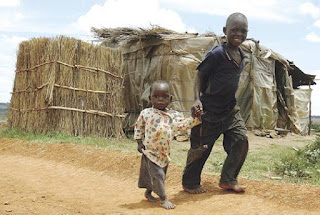Unlimited reports from Zimbabwe speak of many families unable to afford all three meals in a day. In fact the UN and other reputable agencies estimate that the majority of Zimbabweans live on less than US$1.00 per day. US$1.00 in Zimbabwe is just enough for a loaf of bread and perhaps some five eggs.
Zimbabwe poverty is more pronounced in rural areas were for a number of years drought has caused havoc on the food security situation. Millions of rural folk have survived on food handouts from international donors. The government of Zimbabwe political involvement in food distribution has not helped the situation. In fact a significant number of people in Zimbabwe have died of hunger.
The switch from Zimbabwe dollar to multi international currencies in the economy of Zimbabwe has also contributed to raising levels of poverty. This would include lack of housing, clothing, access to medical health, access to education and severe unemployment. In the new dispensation these services are paid for in foreign currency which most in Zimbabwe simply do not have.
As a result of poverty in Zimbabwe many Zimbabweans have fled to settle in neighbouring countries such as South Africa, Botswana, Mozambique and Malawi amongst other countries. The extent of poverty in Zimbabwe has also been clearly demonstrated by the levels of lack in prisons. Many prisoners have died in Zimbabwean prisons ultimately as a result of the inability of relatives outside to meet their most basic needs. Never mind teh government's inability to meet its obligations,
Zimbabwe poverty reached extremes round about the middle of the Zimbabwe crisis when relatives could not bury their dead. Sick people were dumped at under staffed and inadequately equipped hospitals to die. It was such a burden for individual families the government of Zimbabwe with limited resources carried out paupers burials as no one came forward to claim the dead. As per Zimbabwe culture when one dies family and friends gather at the person's home in night vigil until the person is buried. This usually takes 4 to 5 days.
At the height of Zimbabwe's troubles affecting society at the lowest of levels, this cultural practice was broken and people buried their dead within two at most 3 days of death to reduce costs and remove the burden of taking care of people keeping vigil. Cultural practices are dear to the majority of Zimbabweans. This development demonstrated how poverty had even shattered long held beliefs in Zimbabwe.
Poverty in Zimbabwe will significantly decline as the economy takes-off and more people are employed in the formal sector. As it stands most Zimbabweans are surviving on remitances from children, friends and relatives abroad in South Africa, UK and the United States. Indirectly, the world recession of 2008 and 2009 worsened Zimbabwe poverty impact.
Do you have an experience to share about Zimbabwe poverty? Submit your experience below.

No comments:
Post a Comment
Hey thanks for leaving a comment. I appreciate your input. I will activate your comments after a quick scan :)